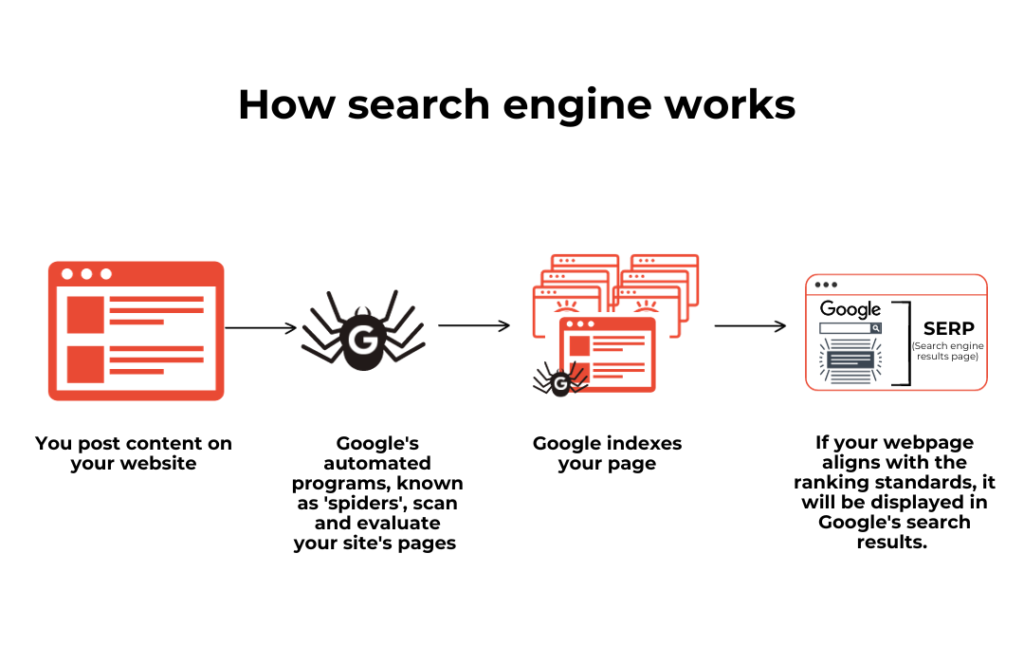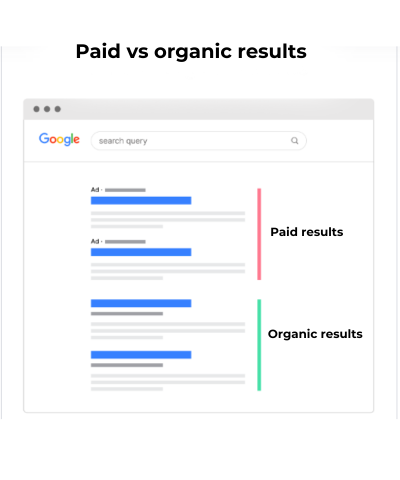
The comprehensive guide to what SEO is and why it matters
In today’s digital landscape, mastering Search Engine Optimisation (SEO) is essential for achieving online success. SEO is not merely a strategy; it’s the lifeblood of online visibility. This comprehensive guide will unveil the hidden gems of SEO, providing you with an extensive roadmap to navigate this complex realm effectively.
Why SEO is important?
SEO is indispensable for online success. Here’s why it matters:
Visibility and traffic
SEO boosts your website’s visibility in search results, driving organic traffic. Being on the first page of search results is crucial for success in the competitive online landscape.
User experience
SEO enhances user experience by optimising content, improving website structure, and ensuring faster loading times. A user-friendly site leads to longer visits and higher engagement.
Credibility and trust
High-ranking websites are seen as more credible and trustworthy. SEO helps establish your online authority, instilling trust in your audience.
Cost-effective
SEO is cost-effective compared to traditional advertising. It targets interested users and generates qualified leads without ongoing expenses.
Global and local impact
SEO can be tailored for global reach or local impact. Local SEO strategies help businesses attract nearby customers.
Mobile and voice search
SEO adapts to mobile devices and voice search trends, ensuring accessibility across platforms and devices.
Analytics
SEO tools provide data-driven insights helping you track performance, refine content, and adapt to changing trends.
In summary, SEO is essential for online success, offering visibility, user satisfaction, credibility, cost-effectiveness, and adaptability in a dynamic digital landscape.
SEO Vs. PPC (Pay-Per-Click)
SEO and PPC are two distinct but complementary approaches to digital marketing.
SEO focuses on optimising your website’s content and structure to improve organic search rankings, driving free, sustainable traffic over time. On the other hand, PPC involves paid advertising, where you bid for ad placement on search engine results pages.
While SEO provides long-term benefits and credibility, PPC offers immediate visibility and control over your ad campaigns. The choice between SEO and PPC depends on your goals, budget, and timeline.
Some businesses leverage both strategies to maximise their online presence, ensuring a well-rounded digital marketing strategy.

How do search engines work?
Search engines are complex algorithms designed to help users find relevant information quickly and efficiently across the vast expanse of the internet. They work through a multi-step process that involves crawling, indexing, ranking, and delivering search results.
Crawling
Search engines use specialised software known as web crawlers or spiders to systematically browse the internet. These crawlers start by visiting a few known web pages, and from there, they follow links to discover new pages. As they traverse the web, they collect data about each page they encounter, including the text, images, and hyperlinks.
Indexing
Once a webpage is crawled, the search engine indexes the content it found. This involves organising the information into a massive database, creating an easily searchable catalogue of web pages. This step also involves processing and storing keywords and phrases associated with each page, which will later be used for retrieval.
Ranking
When a user enters a search query, the search engine’s algorithm goes to work. It sifts through the indexed data to identify the most relevant web pages based on several factors, including keyword relevance, page authority, and user experience. Pages are then ranked in order of relevance to the query.

Delivering results
Finally, the search engine displays the results to the user, typically in a list format. These results are sorted based on the ranking determined by the algorithm. The user can then click on the search results to access the web pages.
Behind this seemingly simple process is a complex algorithm that continuously updates to deliver better results. Search engines take into account hundreds of factors to ensure that users find the most relevant and high-quality information when they search. These factors can include the freshness of content, the number and quality of backlinks, mobile-friendliness, and much more.
Understanding how search engines work is essential for businesses and website owners looking to optimise their online presence and improve their rankings in search results.
The foundation of SEO
Before delving into the secrets of SEO, let’s establish a strong foundation by understanding its core principles.
User intent
To excel in SEO, you must grasp the concept of user intent. This refers to the reason behind a user’s search query. Google and other search engines aim to provide results that best match user intent. By tailoring your content to meet the specific needs and intentions of your target audience, you’ll have a higher chance of ranking well. User intent can be categorised into four main types:
Informational Intent
Users seek information on a specific topic. Example: How to bake chocolate chip cookies; How does photosynthesis work?
Navigational Intent
Users are looking for a particular website or webpage. Example: Facebook login; Amazon customer support.
Commercial Intent
Users are considering a purchase but need more information before making a decision. Example: Affordable laptop deals; Compare iPhone vs. Android.
Transactional Intent
Users are ready to make a purchase or complete an action. Example: Buy iPhone 13 Pro Max; Book a flight to Paris.
Understanding user intent helps you create content that satisfies the user’s needs, increasing your chances of ranking higher in search results.Unveiling the power of keywords
Long-tail keywords
While many SEO guides emphasise the importance of short-tail keywords, long-tail keywords are a hidden treasure. Long-tail keywords are longer, more specific phrases that capture user intent more precisely. They often have lower search volume but higher conversion rates because they attract users who are closer to taking action.
To uncover long-tail keywords, use tools like Google’s Auto Suggest, or even explore related searches at the bottom of Google’s search results pages. Incorporate these long-tail keywords strategically into your content to attract highly targeted traffic.
Semantic SEO
Search engines have become exceptionally skilled at understanding context and semantics. As a result, semantic SEO is emerging as a powerful strategy. It involves optimising content to include related terms and concepts that help search engines better understand the topic.
For instance, if you’re writing about “digital cameras,” incorporating related terms like “photography,” “shutter speed,” and “image sensors” signals to search engines that your content covers a broad spectrum of information related to the topic.
Mastering on-page optimisation
On-page optimisation is where the rubber meets the road in SEO. To ensure your web pages are search engine-friendly, consider the following secrets:
Content silos
Content silos involve organising your website’s content into themed categories or silos. This approach helps search engines understand the hierarchy and relevance of your content. By structuring your site in this way, you create a logical flow of information, making it easier for users and search engines to navigate.
Featured snippets
Featured snippets, also known as position zero, are the information boxes that appear at the top of some search results. These snippets aim to provide a direct answer to the user’s query. To optimise for featured snippets, structure your content to answer common questions concisely. Use bullet points, numbered lists, and clear headings to make your content snippet-friendly.
Video SEO
Video content is becoming increasingly important for SEO. To optimise your videos for search engines, host them on platforms like YouTube, Vimeo, or your website using video sitemaps. Use relevant keywords in video titles, descriptions, and tags. Additionally, provide a transcript of the video content to enhance accessibility and SEO.
Navigating technical SEO
Technical SEO might seem daunting, but it’s crucial for ensuring search engines can crawl and index your website efficiently.
Structured data markup
Structured data, also known as schema markup, provides search engines with additional context about your content. This markup can enhance your search results with rich snippets, including star ratings, event details, and product information.
Implementing structured data can boost click-through rates and improve the visibility of your content in search results. Google’s Structured Data Markup Helper can assist you in implementing this valuable feature.
Website security (HTTPS)
Google considers website security a ranking factor. Websites with SSL certificates (those that use HTTPS) are favoured over non-secure sites. Ensure your site is secure by obtaining an SSL certificate from a trusted provider. This not only boosts your SEO but also instils trust in your visitors.
Mobile-first indexing
As mobile device usage continues to grow, Google has shifted to mobile-first indexing. This means Google primarily uses the mobile version of your site for ranking and indexing. Ensure your website is responsive and optimised for mobile devices to maintain or improve your search rankings.
The art of off-page optimisation
Off-page SEO focuses on building your website’s authority and reputation through external factors.
Earning backlinks
Earning high-quality backlinks remains a cornerstone of off-page SEO. The quality, relevance, and diversity of your backlink profile matter more than the quantity. Focus on building relationships with authoritative websites, publishing guest posts, and participating in industry-specific forums and discussions to naturally acquire valuable backlinks.
Online reputation management
Your online reputation plays a vital role in SEO. Monitor mentions of your brand or website across the internet and address any negative feedback or inaccuracies promptly. A positive online reputation can indirectly improve your search rankings by increasing trustworthiness and credibility in the eyes of both users and search engines.
Continuous SEO success
SEO is an ongoing process that requires dedication and adaptability. These secrets will guide your long-term SEO success.
Regular audits and updates
Conduct regular SEO audits to identify and rectify issues that may be hindering your website’s performance. Use tools like Google Search Console, Google Analytics, and SEO auditing software to gather data and insights. Continuously update and expand your content to keep it fresh and relevant.
Algorithm updates and adaptation
Search engines continually update their algorithms to provide better user experiences. Stay informed about these changes and adapt your SEO strategies accordingly. Subscribe to industry news, follow SEO experts on social media, and participate in SEO forums and communities to stay up to date with the latest trends and algorithm updates.
Patience and persistence
SEO is a long-term endeavour. It may take time to see significant results, but with patience and persistence, you can achieve online success. Consistency in implementing best practices, creating valuable content, and building a robust online presence will pay off over time.
9 truths about SEO
Quality content reigns supreme
High-quality, relevant, and informative content is the cornerstone of successful SEO. It attracts users, builds trust, and earns backlinks.
Keywords are key
Keyword research is critical. Identifying and targeting the right keywords helps you connect with your target audience and improves your chances of ranking higher in search results.
Mobile optimisation is a must
With the increasing use of mobile devices, optimising your website for mobile is essential. Mobile-friendly websites rank better in search results.
User experience matters
Search engines prioritise websites that offer a great user experience. Factors like page speed, navigation, and layout all play a role in SEO.
Backlinks are valuable
High-quality backlinks from authoritative websites are a significant ranking factor. Earning backlinks through great content and outreach is crucial.
Technical SEO is fundamental
Proper technical SEO ensures that search engines can crawl and index your website effectively. This includes optimising page speed, site structure, and meta tags.
Content freshness counts
Regularly updating and adding new content signals to search engines that your website is active and relevant. Fresh content can boost your rankings.
Local SEO matters
For brick-and-mortar businesses, local SEO is essential. Optimising for local searches helps attract nearby customers.
Patience is required
SEO is a long-term strategy. Results often take time to materialise, so patience and consistent effort are key.
SEO is a multifaceted strategy that requires a combination of technical expertise, content creation, and ongoing efforts. While these SEO secrets provide you with an extensive roadmap to online success, remember that SEO is a dynamic field.
Staying informed, adapting to changes, and continuously improving your website’s SEO will ensure your online presence thrives in the competitive digital landscape.
Ready to take your online presence to the next level? At Faye Digital, we specialise in crafting tailored digital marketing strategies to drive results. Whether you’re looking to boost your SEO, conquer social media, or enhance your overall digital strategy, we’ve got you covered.
Contact us today to schedule a consultation and discover how Faye Digital can help your business thrive in the digital landscape. Don’t miss out on the opportunity to excel in the competitive online world. Let’s start your digital journey together!
